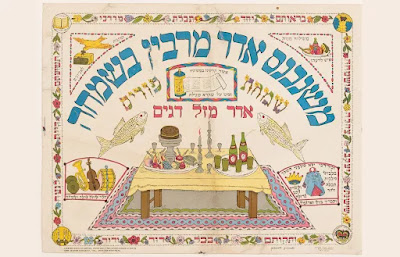"Some say the world will end in fire, some say in ice…"
by HaRav Adin Even-Israel [Steinsaltz]
 |
| Only the Final Redemption will overshadow the Exodus in its significance. |
The Exodus from Egypt was apocalyptic, not only because of the supernatural events that took place during its unfolding, but also because it sparked an extremely significant change within a relatively short amount of time – and without any warning or preparation. It is true that the events recounted in the Book of Exodus did occur over the course of a few months, but when we think about the amazing transformation that the People of Israel underwent as a result – from a loosely related ethnic group of slaves to a new nation – the redemption from Egypt does indeed seem very sudden and surprising.
While Passover is the festival of redemption, the Exodus from Egypt is commemorated on each of the Biblical festivals and all through the year. Even events in Jewish history as important as the re-establishment of sovereignty in Israel during the Second Temple era are not considered to be equal to the Exodus. Our Sages teach that only the Final Redemption will be able to overshadow its significance.
The Exodus has also become a prototype of redemption for all nations of the world, a model against which other redemptions are measured and assessed. The coming of the Messiah is a momentous event – not only for the Jewish people, but for the entire world. It is not simply a matter of national deliverance, nor even of a Jewish renaissance, but of an intrinsic change in world history. In a certain way, the Final Redemption, as its name implies, marks the "end of history," or, at least, the end of history as it has been for the last several millennia.
We know from Biblical prophecies and from the Talmud that there are two possible scenarios for the Final Redemption. The difference between them lies in a fundamental question: will it be a revolutionary event, or an evolutionary one? The first redemption, the Exodus from Egypt, was a whirlwind of supernatural events, a total revolution. Indeed, many descriptions of the Final Redemption – in Jewish and non-Jewish sources alike – depict the final redemption in a similar way. For example, this approach, "the great and terrible day of the Lord," [1] is a universal earthquake which begins with "darkness, not light" [2] and involves colossal wars between "the children of light and the children of darkness." Like the Exodus, the Final Redemption is, so to speak, a Divine tour de force vis-à-vis the world. When God wills it, all of reality will be torn to shreds, and the new day will shine, as was the case in the Exodus from Egypt – out of "blood and fire and pillars of smoke." [3]
The alternative scenario of redemption is an evolutionary one and is based on human progress – whether slow or fast – toward a higher state of existence: "For you shall not go out in haste, neither shall you go by flight; for the Lord will go before you, and the God of Israel will follow you behind" [4]; or, in other words, "in sitting still and rest will you be saved." [5] While the Exodus from Egypt contained an element of flight, this redemption will be a slow, smooth process and, despite the enormous differences between the present and the future, it will still be possible to discern the steps that paved the way for the redemption. Even the Biblical metaphor that likens redemption to birth – a dramatic event with a clearly defined "before" and "after" – presupposes the long pregnancy that came before it.
Will the future redemption be a revolutionary event, or an evolutionary one? The difference between these two diametrically opposed scenarios can be explained by the somewhat enigmatic Talmudic saying: "The son of David [the Messiah; in other words, the final redemption] will come only in a generation that is either altogether righteous or altogether wicked." [6] Redemption for an "altogether righteous" generation is preceded by years of preparation in which people work to better themselves. This kind of redemption is just the finale of an evolutionary process. On the other hand, the redemption of an "altogether wicked" generation cannot possibly be an extended, slow process, because such people, by their very nature, make no preparations for it. Therefore it must entail a revolutionary outburst, which, in this case, is not a grass-roots effort but a Divine one. As such, it must shatter the old patterns of existence – a painful, even tragic event.
The future redemption is, in many ways, the continuation and completion of the Exodus. We know from the Book of Exodus[7] that the redemption from Egypt occurred at midnight; the end of the Passover Haggadah includes references to the future redemption as the second half of this night of deliverance. This is not only solace and encouragement in the face of our present trials and tribulations; it is also a logical sequence.
The Exodus, then, is a comma in the manuscript of world history, whereas the final redemption is a full stop. But what shape the final redemption will assume depends, to a great extent, on us as human beings. Through the totality of our actions, we will determine whether we are an "altogether wicked" or "altogether righteous" generation and, consequently, if we can expect "blood and fire and pillars of smoke" or salvation through "sitting still and rest."
FOOTNOTES
1.
Malachi 3:23.
2.
Amos 5:18.
3.
Joel 3:3.
4. Isaiah 52:12
5.
Ibid., 30:15.
6.
Tractate Sanhedrin 98a.
7.
12:29.













